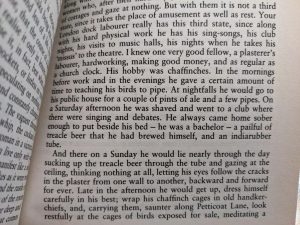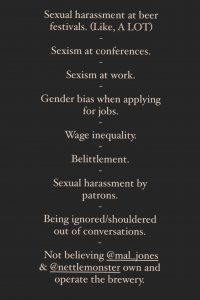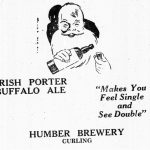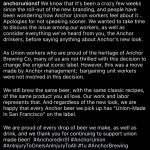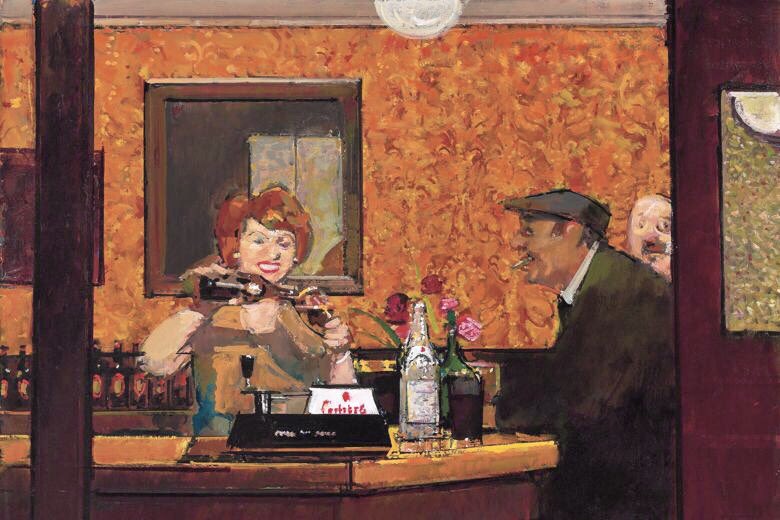One of the worrying things about these weekly news note posts is how rapidly one follows another. I wonder if they speed the pace of life. It’s not unlike shaving every morning. I look in the mirror and say “not you again!” But it is never quite again. Time the revelator.* Or maybe more time the avenger?** Well, no time to wallow in that puddle as there’s news to note. Beer has to display the entire breadth of human experience, from the highs to the ruts. Starting off, Pellicle posted an excellent story this week about the dire situation facing independent bottle shops in the UK.
Otters Tears first opened in 2015, bravely attempting to turn the fortunes of an already struggling high street. But, as with Beer Ritz in Leeds, in 2020 it was forced to close its doors, shifting sales entirely online. The turning point for Hardy was a particularly busy match day at local football club Port Vale. It left Phil pinned behind the counter at the rear of the store, with the seating area in the cellar largely ignored by the “vertical drinkers” standing in the shop’s entrance. “I stopped doing drink-in from that point on,” Phil says. “We didn’t lose any money by doing it, but it was far less stressful.”
 Not quite similarly, this image passed by this week, of a calm dog in the corner of an Irish pub. I am less interested in the dog than the corner, honestly, and more into the decades old patina of shoulders and sweat, greasy old wool coat and even possibly Brylcreem that makes up that lovely look. Less lovely, Britain’s roughest pub. Jings.
Not quite similarly, this image passed by this week, of a calm dog in the corner of an Irish pub. I am less interested in the dog than the corner, honestly, and more into the decades old patina of shoulders and sweat, greasy old wool coat and even possibly Brylcreem that makes up that lovely look. Less lovely, Britain’s roughest pub. Jings.
Interesting update on a stats discussion held in June 2020 about how little effect Covid-19 had on US alcohol consumption – except in relation to who was benefitting from the sales:
About a year ago, I was saying that COVID-19 wouldn’t lead to a large increase in alcohol consumption per capita (see below), and then it didn’t. It *did*, however, cause a large redistribution of income from small to large businesses…
Relatedly, US stores are ditching craft beer from their shelves to stock the more profitable seltzer crap. I bought a box on the insistence on my kid the other day. I took a teaspoon of four flavours. All certified crap. But craft beer is cheuggy so it has to go. Sad. Conversely, minor league baseball has better options that they are exercising – like in Syracuse where they have teamed up with a craft beer bar:
…confidence is built around what he calls the stadium’s beer “guru,” Kara Johnston. He sees her as a future Hall of Famer in beer procurement. She’s the person responsible for stocking up and often serving at The Hops Spot, the dedicated craft beer emporium on the first base side of the stadium concourse. It’s affiliated with the downtown Syracuse beer, burger and poutine bar of the same name and has up to 100 different beers on rotation.
 Sadder was the lone beer can mascot spotted at an NHL playoff game this week. The only person allowed to watch the game and they had to dress up in a beer can suit. Did they dance? Who did they dance for? Probably wished he was in Syracuse. Bud Light was light of buds that night…
Sadder was the lone beer can mascot spotted at an NHL playoff game this week. The only person allowed to watch the game and they had to dress up in a beer can suit. Did they dance? Who did they dance for? Probably wished he was in Syracuse. Bud Light was light of buds that night…
Hopwise, Stan wrote an interesting article published in CB&B (which really should have been in last week’s edition) about the potential end of some hop varieties:
Craig Mycoskie, Round Trip’s founder-brewer, does not yet have any hop contracts, but he isn’t worried that Hop Head Farms (Hickory Corners, Michigan) will be out of Tettnanger or Select when he needs more. Like lagers themselves, we take them for granted—it’s as if nature herself chose the classic varieties and will always provide them… However, that doesn’t mean they’re immune to climate change and environmental regulations. At times, hops with old-fashioned characteristics are exactly what you need to make old-fashioned lagers and other classic styles. If growing those vintage varieties should somehow cease to be practical—and there are some indications that may be the reality—then breeding new ones with old-fashioned character is going to be necessary.
H/T to @Glidub for the link to an interesting guide as to how to avoid Māori cultural appropriation which was published in 2019 but serves as an example of many sorts of guide craft beer should be adopting.
In addition to the sad spectacle of the ethical genuflect in the craft beer trade, actual stories about horrible situations in craft brewing continue to come out and one particular sort of shocking I had not expected was that of the co-owner shoved out of management.
Questioning inappropriate behavior was seen as a buzzkill. Establishing paid maternity leave was not a priority. When I welcomed my second child in 2014, I returned to work after six (unpaid weeks), strapping my little girl to my chest to carry on. As a mom of two young children, when I expressed the need for a better work/life balance, it was seen as a lack of commitment to the business. Advocating for fair compensation was an annoyance. Expressing the need for help in my ever-expanding job responsibilities was a weakness. “You’re not acting like an owner,” is what I was told over and over and over.
Relatedly, Beth Demmon wrote a piece In GBH on the resistance being expressed by trade associations to the suggestion that they take on the important job of ensuring their members are in good standing, including being in line with the normal sorts of codes of conduct that we see in many sectors. I was thrown off by this following unclear statement that suggested taking on this oversight to protect the public was not part of the toolbox available to non-profit corporations like these:
It’s very, very unlikely many organizations have the ability, or desire, to address most instances of harmful or rule-flouting behavior by their members.
It’s actually quite likely they have the ability, subject to the general local corporate law under which they operate. They just need to amend their by-laws and pass the amendment at a general meeting. Easy peasy. It’s really only the desire they lack.*** Because presumably it would rock the boat… or… craft… Remember, like the myths we see about the actual authority of those NDAs brewing staff are asked to sign, craft loves the fibs. Forget that stuff! It is important to hold craft beer brewers and organizations to account for not taking on the responsibility to ensure their membership acts appropriately.
Elsewhere, big asparagus is giving out medical advice. In other health news, all alcohol kills your brain cells. Contrast this mere science with this but of education news: an Anglo Saxon school primer from the 1000s with the a discussion with a teacher that affirms from the student: “Ale if I have it…” Which reminds me a bit of this early tale of craft in Ontario:
The Deli was a secret room at Upper Canada Brewing Company made from empty glass skids used for surreptitious day drinking. One day we realized every single production team member was in there and we could hear our brewmaster vainly searching for employees… We waited a bit and slipped out one by one so as not to raise any more suspicions. Thank goodness for unions.
Finally, Boak and Bailey sent out their newsletter again this month which includes a lifting of the corporate veil:
Even though the blog has been a bit quiet lately – we’ve both been busy to the point of burnout at work – somehow our Saturday morning news roundups keep happening. They’ve become a habit, really, with both of us bookmarking things throughout the week and then one of us (usually Ray, at the moment) doing the write up at dawn on Saturday morning with a big mug of tea or coffee at hand. The other (usually Jess) reviews, edits and editorialises, if required – particularly important when we’re trying to summarise complex issues such as sexism in beer or the politics of lockdown.
So that’s how it works! Please don’t forget to check out those weekly updates from Boak and Bailey mostly every Saturday, plus more with the weekly Beer Ladies Podcast, at the weekly OCBG Podcast on Tuesday and sometimes on a Friday posts at The Fizz as well. There is a monthly sort of round up at The Glass. There is more from the DaftAboutCraft podcast, too. And the Beervana podcast. And sign up for Katie’s weekly newsletter, The Gulp, too. And check out the Atlantic Canada Beer Blog‘s weekly roundup. Plus follow the venerable Full Pint podcast. And Fermentation Radio with Emma Inch. There’s the AfroBeerChick podcast as well! And also look at Brewsround and Cabin Fever. And Ben has his own podcast, Beer and Badword – when he isn’t in hiatus as at the mo, more like timeout for rudeness. And remember BeerEdge, too. Plus a newcomer located by B+B: The Moon Under Water.
*Listen.
**Listen. Though to be fair I thought this one was called “Tiny Avenger” for a long time.
***Last evening in about an hour’s reviewing of the internets, it became clear that it was quite likely it was that brewing related organizations did have the ability to kick out pervy members.

